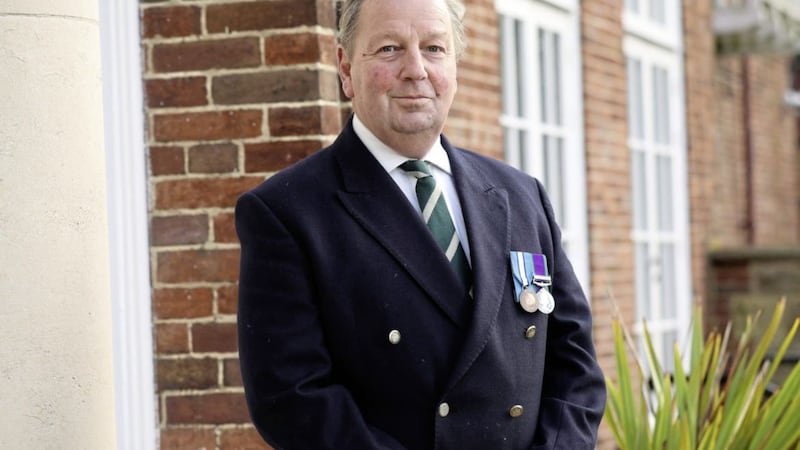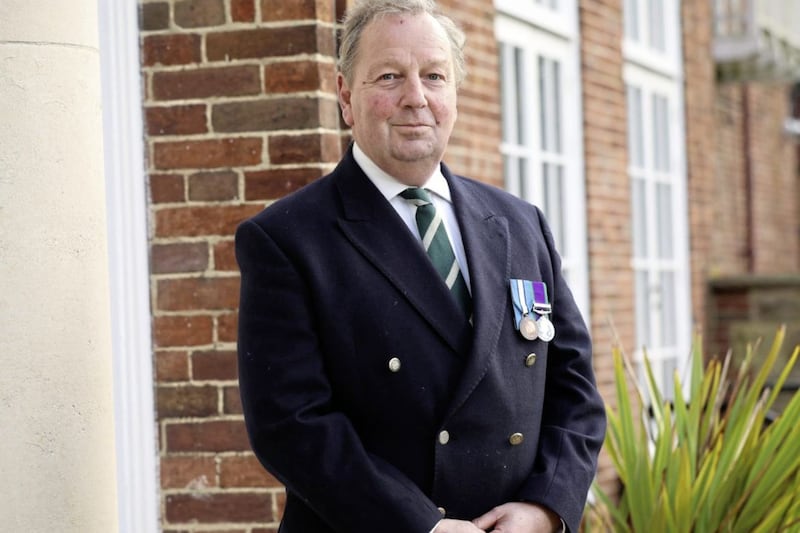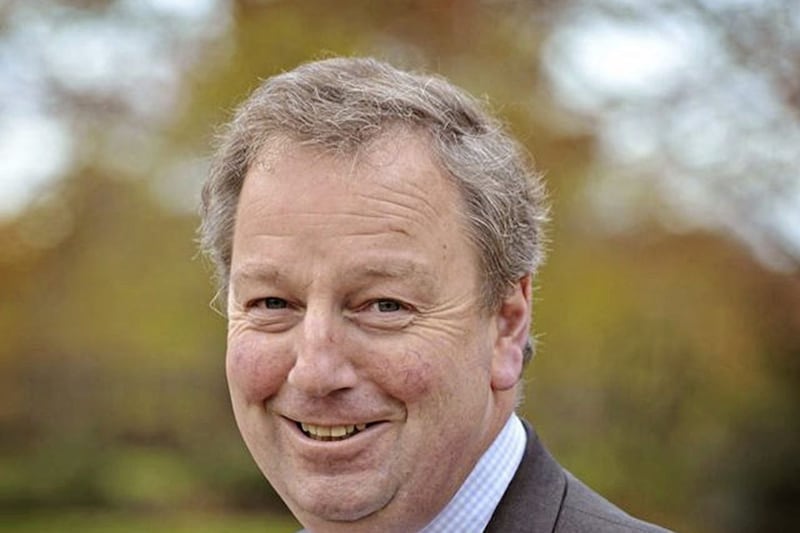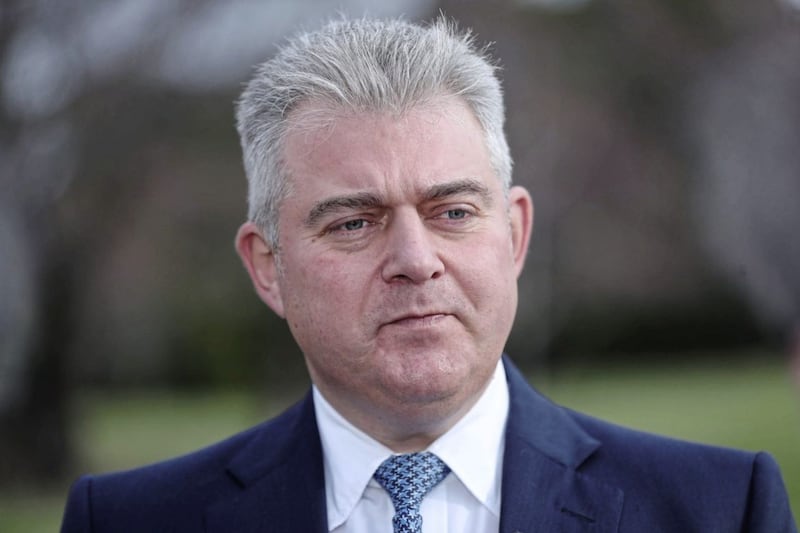DANNY Kinahan acknowledges that not everybody shares his view of the armed forces and their ex-personnel, the people who as the north's first veterans’ commissioner, the erstwhile Ulster Unionist MP represents.
While he concedes that changing many people's perceptions is a challenge, he's nonetheless determined to try, stressing how British soldiers were first deployed on the streets of west Belfast to "protect the people from terrorism".
"Veterans reflect the whole of society - Northern Irish, Irish, Scottish, Welsh - all working together," he says.
"I want to get away from the politics and try and change the idea that veterans represent one side. People join the army for all sorts of reasons."
The Co Antrim-born 63-year-old was appointed to the role almost a year ago.
His association with the British Army dates back to his teenage years in the 1970s and included a six-month tour of the north with the Black Watch the following decade. He left the military full-time in the mid-1980s, returning to run the family's expansive farm in Templepatrick.
A former MLA, his last public role was as a councillor on Antrim and Newtownabbey Council, from which he stood down last year.
As veterans' commissioner, his remit is to represent the interests of former British Army, Royal Navy, Royal Air Force and Territorial Army personnel, which is estimated to be around 150,000 people in Northern Ireland.
As the part-time role carries no statutory powers, it primarily consists of lobbying, whether it be at Stormont, Westminster or the Dáil.
Mr Kinahan readily admits that there is no shortage of "big charities, small charities and regimental associations” promoting the veterans' cause but that a small number of vulnerable individuals fall through the net.
"We've almost made it too complicated," says the commissioner, pointing to the health, housing and education issues that veterans and their families encounter as they transfer from the institutionalised structures of the forces to civilian life.
Along with the creation of the veterans' commissioner's role, the British government has introduced a military covenant, which aims to ensure those who served in the armed forces are "treated fairly".
The commissioner initially suggests veterans are discriminated against before moderating his claim to what he terms "perceived discrimination" and a sense from veterans that their counterparts in Britain are treated more sympathetically.
However, he suggests the military covenant, which is expected to be applied to the north via a legislative consent motion at Stormont, may change very little.
"It might make absolutely no difference," he says.
"It could just be symbolic but it matters to veterans to have that symbolism. It matters when you're trying to get your house that you have legislation behind you."
He rejects the suggestion that the covenant will give veterans preferential treatment, arguing that it's "only designed to get them on the same level as others".
On the British government's recent proposal for a statute of limitations applied to prosecutions for Troubles offences up to 1998, Mr Kinahan says veterans, "like society", are divided – though ultimately he gives the proposal a qualified welcome.
He argues that the system is "pretty lopsided", pointing to the "365 royal pardons, and over 300 letters of comfort" that he says republicans have received since the signing of the Good Friday Agreement.
The commissioner supports his assertion that the "court justice system doesn't work" by pointing to April's collapse of the Joe McCann murder trial, projected legacy costs of "around £1 billion" and "92 tonnes of paperwork".
"Veterans don't want an amnesty – they've done nothing wrong and they'd much rather go to court to show they've done nothing wrong," he says.
"But that doesn't help society. They certainly don't want equivalence. They went out to protect society and others put on their balaclavas to shoot people. They never want to be seen in the same light."
Asked if what occurred on Bloody Sunday was murder, the commissioner settles on the legal definition, arguing: "You only use the term murder if you've gone to court and a court finds murder."
"The system is you're not guilty until found guilty and we should stick with that."
When asked if he believes a disproportionate number of veterans have been prosecuted, Mr Kinahan says they are "54 per cent more likely" (to be prosecuted than a republican or loyalist), appearing to misquote the '54 times more likely' claim made last year in relation to British Army veteran Dennis Hutchings. FactCheck NI last month concluded that claim is "inaccurate".
"Vexatious is the wrong term, it's just imbalance and there should never be imbalance in your legal system," he says.
Nor does the commissioner accept that for a long time, especially while the conflict raged, the legal system favoured state actors.
"In the early days there was so much happening, which is why you never got a proper investigation – incidents happening in quick succession," he says.
"The Troubles themselves made it too difficult and that's the real cause. No one should have gone out with a gun in the first place but if you accept that the Troubles are happening, they themselves made it difficult."
He suggests post-conflict the legal system was "chopped and changed" resulting in "the mess we've got today".
Mr Kinahan doesn't name names but suggests the approach of "some Stormont parties" towards legacy isn't entirely sincere. He believes there's a reluctance to get involved because it's a "lose, lose process" that needs parties to "move their red lines". The veterans' commissioner suggests politicians are "trapped" but argues that "the doors must be opened to enable them to move, rather than box them into a corner". He advocates engagement from all sides on the British government's consultation, even though many believe the de facto amnesty proposal is a fait accompli.
When asked if there's a route out of the legacy morass, he points to the British government’s pledge to "do something", coupled with its Westminster majority.
"They've got to do it sympathetically and they're determined to do it but remember we're one small cog in the whole of the UK in this system," he says.








